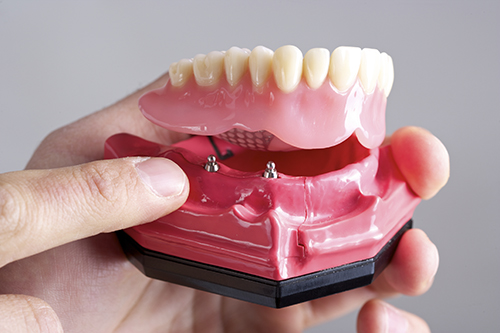
|
Dental Implants
|
Your denture can be stabilized in your mouth with the assistance of dental implants, while still being removable when you choose. This denture alternative offers patients the choice of removing the restoration from the dental implants for flexibility and hygiene, without any of the frustrations of traditional dentures. We understand that patients have different needs, and we have created varying options to help meet them.
Teeth are supported in your mouth by bone and soft tissue. The tooth root, or base of the tooth, is embedded in the jawbone and the gum tissue that surrounds the tooth provides additional strength and support. Patients who suffer from gum disease lose the support of gum tissue, the tissue recedes from the infection, while also pulling away from your teeth. Additionally, the bone is deteriorated from the infection causing a loss of bone. With the significant loss of tissue and bone, the patient’s teeth will come out, due to the insufficient tissue to support them. The statistics are improving with modern dental education, but currently, 27% of adults over the age of 65 have no healthy teeth remaining due to gum disease and decay.
We can provide patients with an incredible alternative to traditional dentures. We can surgically place dental implants to support and stabilize your denture. Dental implants are a metal post, made of titanium, that we can embed into the jawbone, serving as a new tooth root. All other restoration options are designed to float false teeth over the gum area; only a dental implant rebuilds the base. Floating dentures have never been an ideal solution, they provide the most minimal function and will never feel like your natural teeth. Stabilizing your denture with implants will vastly improve your function, your feel, and your look.
A dental implant is a titanium post or rod that we surgically place to serve as a new tooth root. Studies on implants began in the early 20th century. Scientists had noted centuries of attempts of having a device embedded into the gum ridge to serve as an alternative tooth. The part that impressed early doctors and dentists is that the body showed a certain level of actually healing around the device. This healing process is known as osseointegration, which means the joining or becoming part of the bone. In the early 20th century, doctors began experimenting with this natural process by surgically restoring bone with metal. Through trial and error, they finally settled on titanium being the most biocompatible, with the addition of being superiorly strong and lightweight. Today, titanium is used for surgical repairs in all parts of the skeletal frame. Doctors use titanium rods for repairs hips, shoulders, knees, and more.
Dental implant studies using titanium rods began in the 1960’s. The results today after decades of research have proven this to be an incredible option for restoration. Patient’s after a decade of wear still had a greater than 97% success rate. Patients after a 20 year period of wear showed similar results, in fact, most patients we able to keep their implants for the remainder of their life.
Today, dental implants have become known as the best option when replacing missing teeth, and increasingly it is being done.
Using two to four implant attachments anchored to the bone, implant dentures preserve bone strength, increase your function and help your facial shape be supported keeping your face looking younger. The surgical procedure is minimal and approved for even medically delicate patients.
Before surgery, we will want to review your medical history, we will want to be aware of any medical issues, even if they seem irrelevant to your mouth. We will also want to review all the medications you are taking. How a patient heals is important to this process, and some health problems and medications can slow down a patient’s ability to heal. If healing is problematic for you, this does not eliminate you as a candidate for surgery but may mean that we need to work with your physician to seek alternatives or adjustments to medications.
A majority of the work for dental implants is in the planning and prep. Using 3D images, we examine the health of the bone and the best place for placement. We want to sink the implants into healthy, robust bone. Implants for dentures tend to be longer in length, allowing us to reach denser bone, though there are also mini implants] used, it will depend on the specific patient’s needs. With the 3D images, we will create a precise map for implant placement. This will also help us determine how many implants are needed to support your denture.
The surgical procedure is pretty simple, and the patient feels very little, if any, discomfort. We begin by providing an anesthetic. Most patients will require a simple local anesthetic to numb the area, though we also provide various conscious sedation options if necessary. With the patient comfortable, we are then able to take our precise plan that has already been assembled and begin the process.